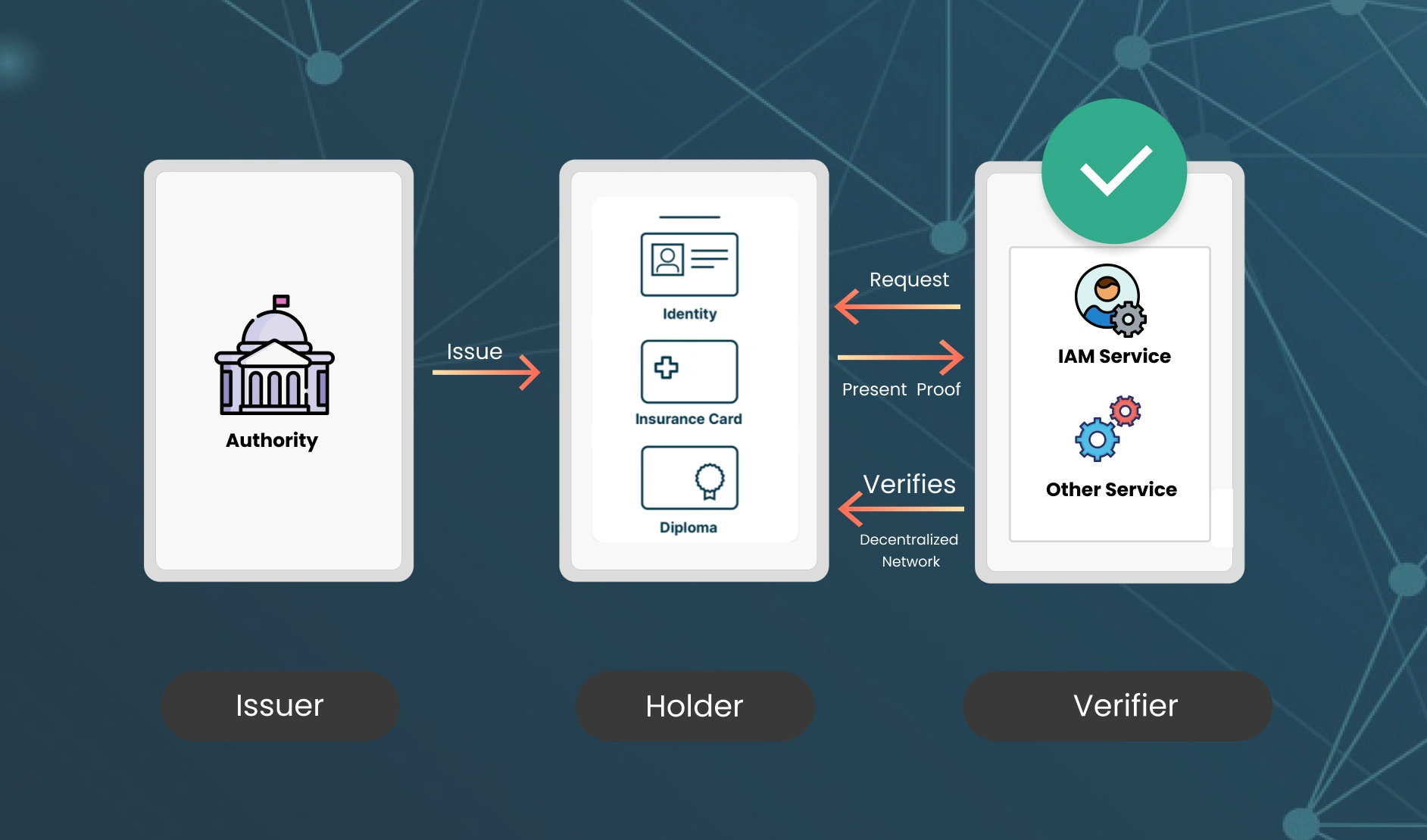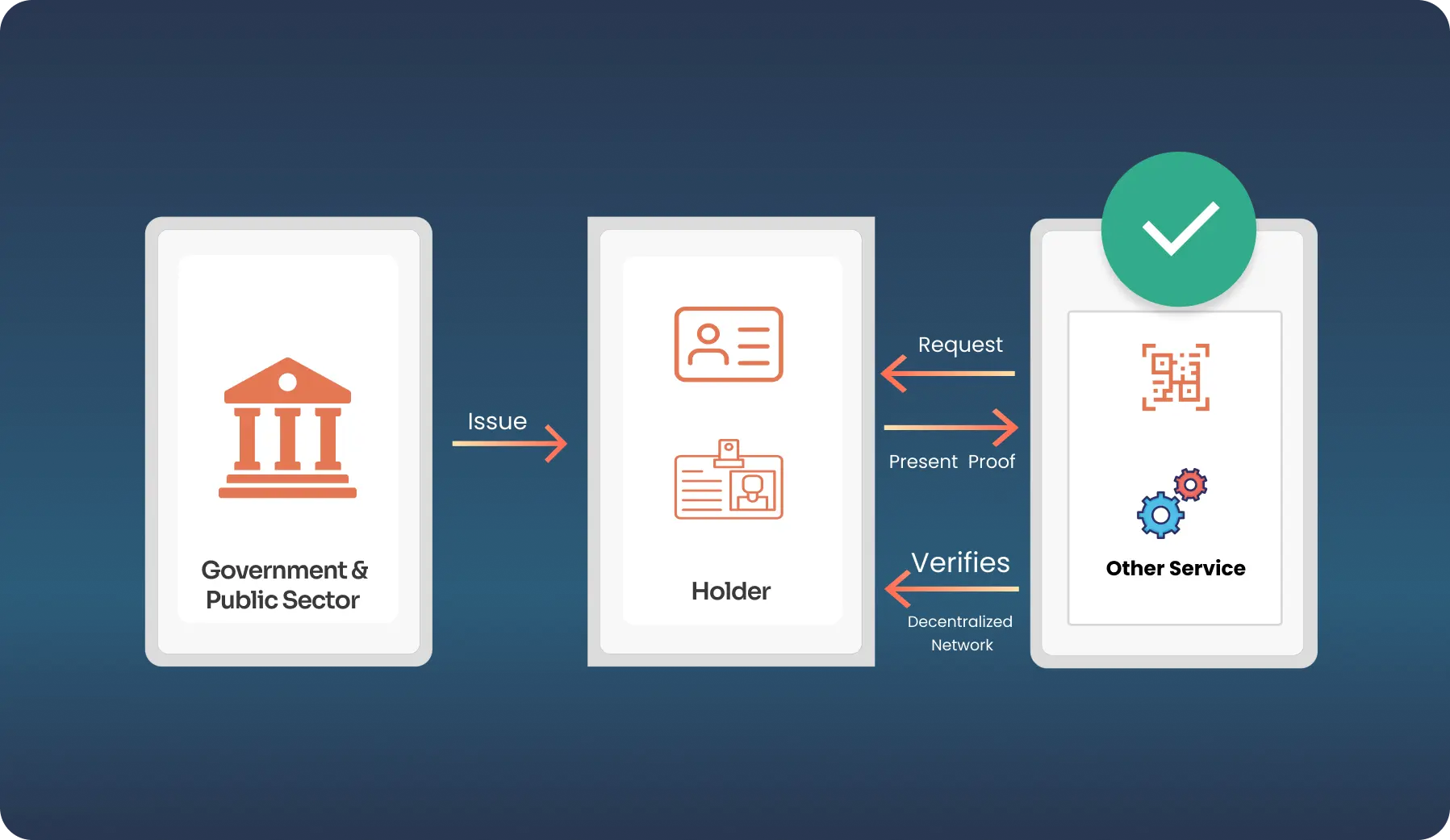Digital identity is all the personal data, credentials, and online interactions that uniquely define you in the digital world. But have you ever wondered who really owns your digital identity? Every time you sign up for a new app or service, you're handing over bits and pieces of your personal information. Banks, social media platforms, and even governments hold the keys to who you are online.
But what if things worked differently? What if you were the only one in charge of your data? That’s where Self-Sovereign Identity (SSI) comes in—a revolutionary concept that flips the script on identity management. With SSI, you can control your information and decide who gets to see it, without unnecessary middlemen. Sounds amazing, right?
Let’s dive into what makes SSI the future of digital identity security!
What is Self-Sovereign Identity?
Self-Sovereign Identity (SSI) is a user-centric, decentralized identity framework that helps individuals manage and control their digital identity securely without depending on third-party providers to store them. Traditional identity systems rely on central authorities (like governments, banks, or social platforms) to issue and manage identities, often creating vulnerabilities like data breaches and unauthorized surveillance.
SSI overcomes this by:
- Eliminating intermediaries.
- Using decentralized identifiers (DIDs) and verifiable credentials.
- Ensuring users retain complete ownership of their digital identities.
Take for example:
Instead of a bank storing your details, you hold them in a digital wallet. When needed, you share only the required proof—say, your ID number—not the entire document containing other personal details.
Self-Sovereign Identity, or SSI, is all about putting you in the driver’s seat when it comes to your digital identity. Think of it as your personal digital wallet—not for money, but for credentials like your ID, diploma, or medical history.
With SSI, there’s no central authority controlling your identity. Instead:
- You own your data.
- You decide who can access it.
- It’s secure and private.
Why is Self-Sovereign Identity Important?
The rise in cybercrime, identity theft, and data breaches has highlighted the flaws in centralized identity systems. For instance, in January 2024, Malaysia's Padu, a central database used for socio-economic profiling, mistakenly allowed individuals to register other users by using identity card numbers and postcodes, bypassing electronic verification. Instances like these highlight the risks of relying on flawed identity systems that could compromise an individual’s data privacy.
SSI offers a strong alternative to traditional identity systems by:
- Improving Privacy: SSI enables users to share only essential information, protecting other sensitive details.
- Secures Users: Users have the autonomy to control their data without needing third-party approval.
- Better Security: Decentralized storage and cryptographic verification reduce the risk of fraud and hacking.
- Compatible Globally: SSI eliminates barriers for underserved locations, enabling financial and social inclusion.
Here’s an example:
In Estonia, digital IDs allow citizens to vote, pay taxes, and access healthcare online, setting a global example of digital identity management. SSI takes this further by decentralizing control and ensuring data sovereignty.
3 Key Pillars of Self-Sovereign Identity
SSI operates on three key pillars that set it apart from conventional identity systems.
Decentralization
User data is stored across a distributed ledger, such as blockchain, ensuring security against hacks and data breaches. This eliminates the risks associated with centralized data storage. At its core, SSI removes the dependency on centralized entities like banks, governments, or social media platforms to manage identity. Instead, identity data is distributed across decentralized networks like blockchain.
User Control
Self-Sovereign Identity empowers individuals to take complete ownership of their digital identities. With SSI, users have the authority to decide what information to share, with whom, and for how long, without needing third-party intermediaries.
Interoperability
SSI credentials meet global standards like W3C, allowing them to function seamlessly across different platforms. This ensures secure transactions anywhere. Verifiable Credentials (VCs), the backbone of SSI, are digital documents that prove identity information in a secure, tamper-proof way. For instance, a verifiable credential could state, "John is a trusted software developer," signed by a recognized authority such as a university or certification board.
Principles of Self-Sovereign Identity
Self-Sovereign Identity (SSI) is founded on a set of principles that guarantee its functionality, security, and user-centric approach. These principles shape how identities are created, managed, and verified, establishing trust within digital identity ecosystems.
- Control
SSI gives users complete control over their identity data. Unlike traditional systems where organizations or governments manage personal information, SSI places full authority over credentials in the hands of individuals. - Portability
Identity data is not confined to a specific platform or provider. SSI credentials can be stored in any compatible wallet and used across various systems or organizations, making them highly portable. - Security
Advanced encryption and blockchain technology are fundamental to SSI, ensuring data integrity and security. Credentials are stored in a decentralized manner, protecting them from centralized breaches. - Decentralization
SSI systems are distributed rather than controlled by a single authority. No single organization or government owns or manages SSI infrastructure, preventing misuse or monopolization of identity data. - Transparency
The technologies and processes behind SSI systems are open and verifiable. This transparency builds trust among users and organizations, reducing the risk of manipulation. - Persistence
Identity credentials under SSI remain valid and accessible over time. They are not tied to temporary systems and can outlast organizational or technological changes. - Interoperability
SSI systems are designed to function across different platforms, organizations, and geographies. With standards like Decentralized Identifiers (DIDs) and Verifiable Credentials (VCs), SSI ensures seamless interaction across diverse systems.
Real-World Use Cases of SSI
- Education
Document and degree verification in the education sector is often time-consuming and prone to errors with traditional methods. SSI allows graduates to carry digital versions of their diplomas and certifications in an SSI wallet. Employers can instantly verify qualifications without waiting for verification calls to universities or worrying about falsified or lost paper credentials. This ensures authenticity for employers and provides graduates with a faster, more secure way to prove their achievements. - Online Shopping
The use of SSI can dramatically reduce fraud in e-commerce, where return fraud alone costs U.S. merchants billions annually (up to $101 billion in 2023). SSI's decentralized verification addresses this issue effectively. Additionally, SSI ensures privacy during age-restricted purchases by sharing only the necessary proof of age without revealing sensitive personal details such as full name or birthdate. This reduces identity theft risks and enhances the shopping experience for both retailers and consumers. - Travel
Long passport lines at airports, which can take anywhere from 30 minutes to over an hour, are a common frustration for travelers. SSI introduces digital passports that allow travelers to confirm their identity and nationality by simply scanning their phones at border control. This eliminates the need for physical documents and shortens processing times. By implementing SSI, governments can make cross-border travel faster, safer, and more efficient. - Finance
In the financial sector, the KYC (Know Your Customer) process is often manual and time-intensive, with 31% to 60% of tasks handled manually by most institutions. SSI simplifies KYC by enabling customers to share verified identity information directly from their digital wallets. This accelerates onboarding for new clients, reduces paperwork, and ensures compliance with regulations. Financial institutions can enhance customer experience and streamline operations using SSI.
Self-Sovereign Identity Wallet
Mobile Wallets
Mobile wallets provide convenient access to credentials at any time, enabling seamless self-sovereign identity management on the go. These wallets are specifically designed for smartphones or tablets, making digital credential management portable and user-friendly.
- Evernym Connect.Me: A widely used mobile wallet supporting verifiable credentials, allowing users to manage their digital identity securely and efficiently.
- Trinsic Wallet: Offers secure credential management with intuitive sharing options, ensuring privacy and giving users complete control over their identities.
Web-Based Wallets
Web-based wallets are cloud-based solutions accessible through web browsers, offering flexibility for users to manage digital credentials on multiple devices and platforms. They combine the benefits of decentralization with cross-platform usability.
- uPort: A decentralized identity system with a web-accessible wallet, enabling secure and decentralized identity and credential management.
- MetaMask: Originally designed for cryptocurrency, MetaMask now supports decentralized identity solutions, allowing users to store and share credentials across various platforms.
Browser-Based Extensions
Browser-based extensions integrate directly into web browsers, offering a seamless way to manage and share credentials for online activities. These extensions are highly convenient for users in Web3 environments or those engaging in decentralized finance (DeFi) and other blockchain applications.
- MetaMask Extension: Besides its cryptocurrency functions, MetaMask’s browser extension supports decentralized identity integrations, enabling users to manage credentials and authenticate themselves across various platforms.
- Blocto Wallet: Focused on ease of use in Web3 environments, Blocto Wallet simplifies the management of decentralized identities and interactions within blockchain-based applications.
How SSI Works
SSI works by establishing trust between those who issue, hold, and verify identity data. The data holder – the individual – uses a digital wallet on their mobile device, in which they hold their verifiable credentials.
A verifiable credential could be a driver’s license, a passport, a degree certificate, ownership of a bank account, and a whole range of other credentials. Some of these have direct physical equivalents; others do not.
The individual can choose which of these credentials they disclose when asked to confirm their ID. Essentially, they are their own sovereign nation when it comes to what they share and with whom (hence the name, self-sovereign identity).
When they need to do so, the individual can generate unique decentralized identifiers (DIDs) to create private, secure, peer-to-peer connections with the organization(s) or any other entity that they wish to share their data with. The DID provides a public key for verification, along with authentication methods, service endpoints, a timestamp, and a signature (private key).
Underpinning all of this is blockchain technology. The blockchain provides the ability for all those who are issuing, holding, and verifying data to access the information they need.
Pros and Cons of Self-Sovereign Identity
| Stakeholder | Pros | Cons |
|---|---|---|
| Organization | Full control over user data, ensuring privacy and security. Reduced reliance on third-party identity providers. Enhanced customer trust and transparency. Cost savings in the long run by eliminating third-party verification fees. |
High initial implementation costs. Requires compliance with various regulations (GDPR, etc.). Complex integration with legacy systems. Potential security risks if not properly implemented. |
| Individual | Complete control over personal data and identity. Easier to manage and share credentials securely. Greater privacy and autonomy. Reduced risk of identity theft or fraud. |
Requires user education and understanding of SSI concepts. Responsibility for maintaining and securing credentials. May not be widely adopted yet, limiting its usefulness. |
| Developer | Flexibility in creating decentralized applications and solutions. Innovation opportunities with blockchain and cryptographic technologies. Potential for reducing identity management costs. Stronger user privacy and security features. |
Complex development and integration with existing systems. Need for specialized knowledge in cryptography and blockchain. Limited adoption could result in lack of user base for applications. Ongoing maintenance and ensuring security could be resource-intensive. |
How does miniOrange Digital ID login & access control help you?
1. Self-Sovereign Identity Protection
With miniOrange, you’re in control of your own digital identity. Our solution allows individuals to manage their personal data, ensuring privacy and trust. You can choose to share information selectively and securely, which helps protect your identity and boosts your confidence in every digital interaction.
2. Unmatched Digital Security
When it comes to protecting your digital identity, security is a top priority. For instance, with miniOrange WordPress Digital ID login solution, you can protect your website from unauthorized access and cyber threats. We use cutting-edge encryption and decentralized identifiers (DIDs) to ensure that your identity is protected at all times. This means that your business can enjoy a new level of trust and security, knowing your data is in safe hands.
3. Greater Privacy Control
When it comes to your personal data, you should have complete control. miniOrange lets you fine-tune your privacy settings, giving you the power to decide what data to share and with whom. This means you can maintain full ownership of your information, keeping everything secure while ensuring you share only what’s necessary.
4. Stay Compliant & Regulated
Compliance with data protection laws is non-negotiable, and miniOrange helps ensure that your digital identity systems meet the latest regulations, including GDPR, eIDAS, HIPAA, and CCPA. Our verifiable credentials and identity verification solutions guarantee that your personal data is managed securely and transparently, reducing compliance risks and giving you peace of mind.
5. Simplified User Experience
We know how frustrating it can be to manage multiple logins and passwords. That’s why miniOrange makes digital identity logins simpler than ever. By using a single credential across various platforms, you eliminate password fatigue and boost user satisfaction. With enhanced security and a hassle-free experience, logging in becomes a breeze—so you can focus on what matters most.
Summary
Self-Sovereign Identity (SSI) is transforming the way we think about digital identity. It gives individuals full ownership of their digital identity, allowing them to control and share their personal data as they see fit, without relying on central authorities like governments or corporations.
For businesses, SSI represents a more secure, compliant way to handle customer data. And for developers, it offers a new frontier for building decentralized, user-centric applications. By embracing SSI security, all stakeholders are participating in the future of trust, where identity is no longer a centralized resource but a personal asset in the hands of the user.
Ready to enhance your security with Self-Sovereign Identity? Explore miniOrange Digital ID Solutions for seamless, decentralized authentication that empowers users and protects your business.
Contact us at info@xecurify.com to get started today and step into the future of digital identity security!
Frequently Asked Questions (FAQs)
1. What is Self-Sovereign Identity (SSI)?
Self-Sovereign Identity (SSI) is a decentralized approach to identity management, where individuals fully control their personal information without relying on centralized authorities. SSI uses blockchain and cryptographic methods to ensure data privacy, security, and user control.
2. How does Self-Sovereign Identity enhance security?
SSI enhances security by allowing individuals to store and manage their identity data securely in digital wallets, with full control over what information is shared. Advanced authentication methods, such as biometrics and encrypted digital identifiers, ensure that only authorized users can access sensitive data.
3. What are the benefits of using SSI for digital identity verification?
SSI offers numerous benefits, including enhanced privacy, security, and autonomy for users. It eliminates the need for third-party verification, reduces the risk of identity theft, and gives users full control over their personal information.
4. Can Self-Sovereign Identity be integrated with existing systems?
Yes, Self-Sovereign Identity solutions by miniOrange can be seamlessly integrated with various platforms and applications, including CMS systems (WordPress, Drupal), e-commerce platforms (Shopify, Magento), and custom applications across mobile and web environments.
5. What platforms are compatible with miniOrange Self-Sovereign Identity (SSI) solution?
miniOrange SSI solutions are compatible with a wide variety of platforms, such as WordPress, Drupal, Joomla, DNN, Shopify, Magento, Wix, Atlassian, Moodle, and technologies like Java, .NET, PHP, NodeJS, and ReactJS. This broad compatibility ensures that SSI can be integrated into diverse systems.
Additional Resources
- Secure your apps with Digital ID Login and Access Control
- Digital Identity Security: How Business Can Leverage It 2025?
- Secure Your WordPress Site with Digital Identity Login
- Decentralized Identity 101: How It Works with Government and Private Wallets
- Web3 Authentication: The Future of Secure Logins
Author





Leave a Comment